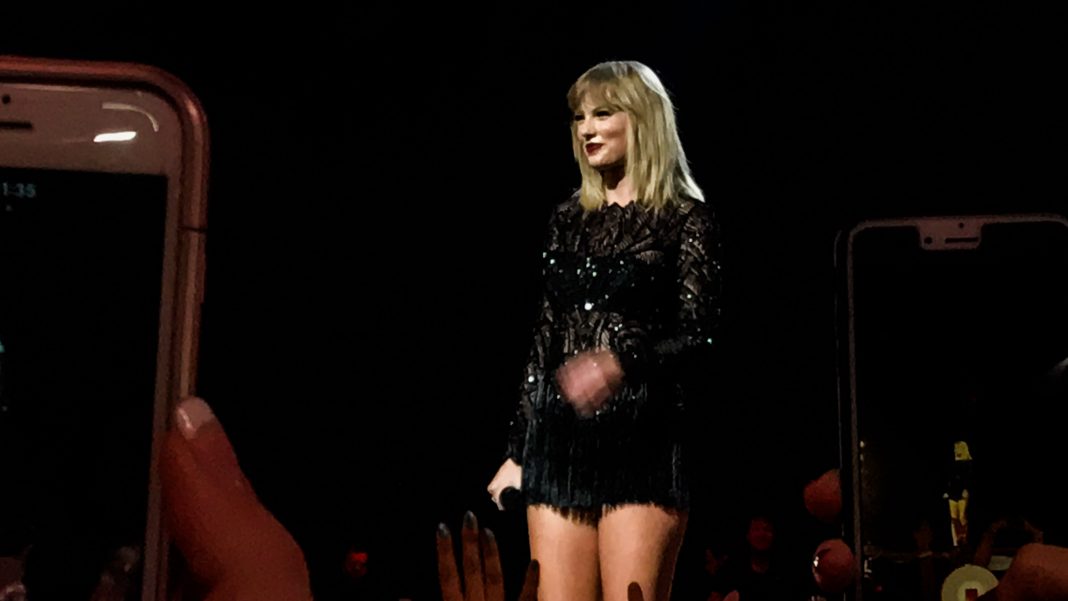Following the chaos of Tuesday’s Taylor Swift “Eras” tour presale, U.S. politicians have come forward, expressing concerns about the 2010 merger between Ticketmaster and Live Nation. Amid these concerns, the company faces complaints by consumers that the companies have abused their dominance of the market.
On Nov. 15, Swifties across the nation geared up for battle as they prepared to fight for tickets for Swift’s upcoming “Eras” tour on Ticketmaster’s Verified Fan Presale, a process concert fans know all too well. What fans did not expect was to be waiting in frozen queues for up to six hours as seats popped up on resale sites for thousands of dollars.
“The experience purchasing tickets for her concert was so emotionally dynamic,” second-year neuroscience major Andres Hernandez said. “It was stressful waiting in the hours-long queue and having to find tickets that were being so quickly bought, yet exhilarating when I was able to get to the finish line and purchase them.”
On Nov. 17, Ticketmaster canceled the general public on-sale that was scheduled for the next day.
“I registered for pre-sale and got on the waitlist,” fourth year criminology and sociology major Veronica Porges said. “Then, when I was excited to get tickets, Ticketmaster canceled the sale.”
Before canceling, Ticketmaster released a statement.
“The biggest venues and artists turn to us because we have the leading ticketing technology in the world — that doesn’t mean it’s perfect and clearly for Taylor’s onsale it wasn’t,” Ticketmaster said in their public address. “While it’s impossible for everyone to get tickets to these shows, we know we can do more to improve the experience and that’s what we’re focused on.”
Following the fiasco, consumers and lawmakers began pointing fingers at Ticketmaster’s merger with LiveNation that went through in 2010.
Back in 2009, many in the entertainment industry testified and argued against the merger, raising concerns that the decision would reduce competition among ticket resellers, leading to increased prices on the resale market.
Testifying against the merger in front of the Senate Judiciary in 2009, David Balto, the former policy director of the Federal Trade Commission and a public interest antitrust lawyer, said that Ticketmaster “holds a monopoly in the ticket sales market” and that the merger would lead to “less choice and higher prices.”
Bill Pascrell Jr., chairman of the House Ways and Means Subcommittee on Oversight tweeted a photo of when he pleaded with the Obama administration to block the Ticketmaster-Live Nation merger. He came forward saying he has opposed the decision since day one.
I opposed the Ticketmaster-Live Nation merger from day one. We said it would crush competition and rip off Americans. Taylor Swift fans are the latest victims. At long last it’s time to break the monopoly up. pic.twitter.com/ypKe113uLi
— Bill Pascrell, Jr. ???????????????? (@BillPascrell) November 18, 2022
The Department of Justice (DOJ) allowed the Ticketmaster-Live Nation merger to go through despite a 2010 court filing in the case raising objections. The recent madness over Swift’s ticket sale has called many lawmakers to weigh in and reexamine the merger.
Daily reminder that Ticketmaster is a monopoly, it’s merger with LiveNation should never have been approved, and they need to be reigned in.
Break them up.
— Alexandria Ocasio-Cortez (@AOC) November 15, 2022
In an open letter to its CEO Senator Amy Klobuchar criticized Ticketmaster, voicing her concerns about the company’s operations since the fiasco on Tuesday.
Klobuchar serves as the chair of the Senate Judiciary Subcommittee on Competition Policy, Antitrust and Consumer Rights and expressed complaints she received from Swift fans unable to buy tickets and further criticism concerning high fees, implying the company “continues to abuse its market positions.”
On Thursday, North Carolina Attorney General Josh Stein and Tennessee Attorney General Jonathan Skrmetti, announced investigations into Ticketmaster for “allegedly violating consumers’ rights and antitrust laws,” after receiving complaints from consumers.
In 2019, after an investigation from the DOJ, LiveNation was found in violation of its agreement. As a solution, language was adjusted to clarify what the company could and could not do when negotiating deals with venues.
Swift came forward in a statement via Twitter saying, “it’s really difficult for me to trust an outside entity with these relationships and loyalties.”
Swift goes on to say she and her management were assured by the company that the software could handle the expected high demand.
“Two of my friends had codes and one of them just sped through the queue while the other’s didn’t move at all. I never even got a code,” second-year broadcast journalism major Julia Hecht said.
However, in an interview with CNBC, Greg Maffei, the chairman of LiveNation Entertainment, blamed Swift’s extensive fan base for the issues faced during the ticket sale.
“Taylor Swift hasn’t been on the road for three or four years and that’s caused a huge issue,” Maffei said. “We could’ve filled 900 stadiums.”
On Nov. 18, the DOJ announced an official investigation into Ticketmaster’s parent company, with a focus on identifying any abuses of power. The 2010 merger between Ticketmaster and LiveNation created a giant in the entertainment industry with none equal in power.






